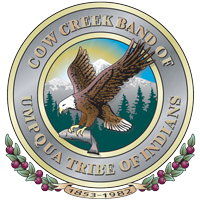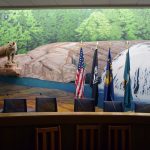Offshore Wind Projects Invite Comment as Tribes Call For More Research
Despite opposition from Oregon Tribes, the Bureau of Ocean Management (BOEM) continues to move forward with public comment on two areas of potential offshore wind energy development.
The wind energy areas (WEAs) in discussion are 32 miles offshore from Coos Bay, and 18 miles offshore from Brookings. The federal government and BOEM are
looking at both areas as possible locations for wind-generated energy farms. Oregon’s Tribes, including the Confederated Tribes of Coos, Lower Umpqua and Siuslaw Indians and the Cow Creek Band of Umpqua Tribe of Indians, have registered comments against implementation of such projects in Oregon’s waters
because of unknown factors that could negatively impact native fish and wildlife.
“The Cow Creek Umpqua Tribe has serious concerns regarding the potential impacts of the Draft Wind Energy Area (WEAs) that have been identified. We are
concerned with potential impacts to native fish and wildlife that are culturally significant species and first foods of the Tribe,” stated comments submitted to BOEM in October.
Tribes also contend that the notification process of a potential project has not been sufficient Tribal consultation.
“BOEM should avoid impacts to cultural resources and have a plan for avoidance that is brought to the Tribe through government-to-government consultation.
The information that has been provided is not detailed enough to fully analyze potential impacts to Tribal resources. Specifically, we need additional information on potential impacts to fish and wildlife and their habitats, as well as effects from potential earthquakes and tsunamis to off-shore wind energy development,” stated Cow Creek Umpqua comments.
Oregon Governor Tina Kotek has said that offshore wind will jumpstart Oregon’s goal of relying on 100% renewable energy by 2024, and that Tribes will be consulted properly during the process.
“We will continue to promote active engagement with Tribal nations, local communities, and other ocean users in the state. We will ensure that all decisions are transparent and based upon the best available science and knowledge,” Governor Kotek said in a recent press release.





